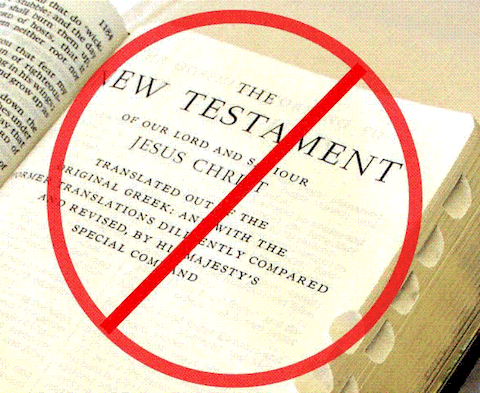
1001 Errors in the Christian Bible
Home
Dedication
Matthew
Mark
Luke
John
Acts
Contact Us
Mark -- Errors 203-209
#203
Mark 10: (KJV)
19 “Thou knowest the commandments, Do not commit adultery, Do
not kill, Do not steal, Do not bear false witness, Defraud not, Honour
thy father and mother.”
Compare to:
Matthew 19: (KJV)
18 “He saith unto him, Which? Jesus said, Thou shalt do no murder,
Thou shalt not commit adultery, Thou shalt not steal, Thou shalt not bear
false witness, 19 Honour thy father and thy mother: and, Thou shalt love
thy neighbour as thyself.”
Same conversation, different commandments. “Mark’s” “defraud
not” may have been intended to be a summary of several commandments
but “Matthew” was apparently bothered by the fact that there
is no such specific commandment so he deleted it when he copied from Mark.
#204
Mark 10: (KJV)
26 “And they were astonished out of measure, saying among themselves,
Who then can be saved?”
The earliest extant manuscripts say “said to him” instead of
“saying among themselves”.
#205
Mark 10: (KJV)
29 “And Jesus answered and said, Verily I say unto you, There
is no man that hath left house, or brethren, or sisters, or father, or
mother, or wife, or children, or lands, for my sake, and the gospel's,
30 But he shall receive an hundredfold now in this time, houses, and brethren,
and sisters, and mothers, and children, and lands, with persecutions;
and in the world to come eternal life.”
Contradicts the commandment in the Tanakh to honor your father and mother.
The Jews primarily thought of “honor” as supporting parents
in their old age. Tough to do if you abandon them. This contradiction
is especially blatant considering that a few verses earlier Jesus explained
that honoring your father and mother was one of the commandments to follow
to obtain eternal life.
#206
Mark 10: (KJV)
34 “And they shall mock him, and shall scourge him, and shall
spit upon him, and shall kill him: and the third day he shall rise again.”
Compare to:
Matthew 20: (KJV)
19 “And shall deliver him to the Gentiles to mock, and to scourge,
and to crucify him: and the third day he shall rise again.”
The authors are reporting the same conversation and “Mark” says
“kill” while “Matthew” says “crucify” (for
the second time). Apparently Mark attached no special significance to
the method of execution while Matthew, reflecting subsequent Christian
thought, specifically says “crucify”, emphasizing the method
of execution.
#207
Mark 10: (KJV)
34 “And they shall mock him, and shall scourge him, and shall
spit upon him, and shall kill him: and the third day he shall rise again.”
Compare to:
Matthew 20: (KJV)
19 “And shall deliver him to the Gentiles to mock, and to scourge,
and to crucify him: and the third day he shall rise again.”
KJV has mistranslated (again) “Mark’s” “and the third
day” above. The underlying Greek has an “after” that KJV
has omitted so it should read “after the third day”. Obviously,
KJV mistranslated to make these important verses agree. So “Mark”
really said “after three days” and “Matthew” said
“on (and) the third day”.
#208
Mark 10: (KJV)
34 “And they shall mock him, and shall scourge him, and shall
spit upon him, and shall kill him: and the third day he shall rise again.”
The underlying Greek has the word “after”. “After three
days”. A small majority of modern Christian translations ignore the
“after” to make Mark 10:34 agree to Matthew 20:19 for this very
critical prophecy.
#209
Mark 10: (KJV)
35 “And James and John, the sons of Zebedee, come unto him, saying,
Master, we would that thou shouldest do for us whatsoever we shall desire.”
Compare to:
Matthew 20: (KJV)
20 “Then came to him the mother of Zebedees children with her
sons, worshipping him, and desiring a certain thing of him.
“Mark” says the two sons went to Jesus and asked a question
while “Matthew” says it was the sons’ mother who went to
Jesus and asked the question. As Jesus’ response is critical Matthew
illustrates his theme of presenting the disciples in a better light than
Mark.